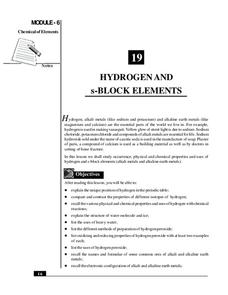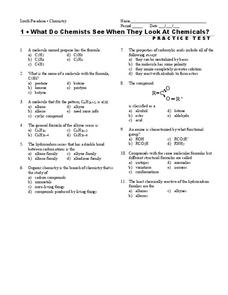Curated OER
Comparing Properties of Elements & Compounds
In this elements and compounds worksheet, students review the physical properties of different compounds and elements using websites for information. This worksheet has 1 graphic organizer and 1 short answer question.
Curated OER
Physical and Chemical Changes Crossword
In this chemistry instructional activity, learners complete a crossword puzzle with 15 clues about both physical and chemical changes. Each clue lists number of letters for correct word.
Curated OER
Answers for Physical and Chemical Changes Crossword
In this chemistry worksheet, students are provided with the answers for a crossword puzzle containing 15 clues about physical and chemical changes.
National Institute of Open Schooling
Hydrogen and s-Block Elements
Lesson 19 in the series of 36 analyzes the element hydrogen and the s-block elements. Through readings, answering questions, and discussion, learners write about and explain their occurrence, physical and chemical properties, and...
Curated OER
Water
In this water worksheet, students compare and contrast elements and compounds. Students define chemical symbols, chemical formulas, and chemical properties. This worksheet has 19 short answer questions.
Chymist
The Solubility of a Salt in Water at Various Temperatures
An educational activity allows young chemists to test the solubility of different types of salt at various temperatures. Groups create a graph using data from unsaturated, saturated, and supersaturated solutions.
Curated OER
Things Are Heating Up
In this science learning exercise, students read about chemical changes. Students also answer 3 comprehension questions about the reading.
Curated OER
Chapter 13 Review, Section 1: Ions in Aqueous Solutions and Colligative Properties
This is an apt assignment for chemistry takers that are studying ionic solutions. Eight questions require problem solving and critical thinking to answer. The first question instructs learners to use a table in the textbook, but you can...
Beyond Benign
Catalysts and Oxygen
Here is an engaging and hands-on lesson plan that allows high school chemists to demonstrate the effects of a catalyst on various chemicals. They garner knowledge of how reactants and products differ from one another, while...
Teach Engineering
Density Column Lab - Part 1
Mass and density — aren't they the same thing? This activity has groups use balance beams and water displacement to measure several objects. The pupils use the measurements to calculate the density of the objects.
Curated OER
Grow an Alum Crystal
What an exciting lab experiment to conduct with your high school chemistry class! Crystals are formed naturally in the environment. However, allow your blossoming chemists to create their own unique crystals using alum and...
Curated OER
Alchemists' Theory of the Elements
In this alchemy worksheet, students read about the early thoughts of alchemists regarding elements. Students are given an experiment done by an alchemist during the Middle Ages and they answer three questions about the experiment knowing...
It's About Time
Elements and Compounds
Young scientists use electrolysis to separate water into its elements before experimenting with fire to learn about their properties. A helpful resource provides a reading passage and analysis questions.
National Institute of Open Schooling
Solutions
Aqua regia, or royal water in Latin, is a solvent that can dissolve solid gold and platinum into a solution. Activity nine in a series of 36 allows classes to learn, through readings and answering questions, what a solution is and the...
National Institute of Open Schooling
Adsorption and Catalysis
Adsorption, not absorption, is when atoms stick to the surface of an object, like water sticking to a grain of sand. An informative lesson delves into adsorption, teaching physical and chemisorption and the factors that affect them....
Chymist
Determination of the Volume of CO2 in Pop Rocks
Where does the pop in pop rocks come from? An engaging activity asks scholars to measure the amount of carbon dioxide in a package of Pop Rocks candy. Learners dissolve the candy in water and use the solubility of CO2 to determine its mass.
Curated OER
Classifying Chemicals
In this acids and bases worksheet, learners identify the strengths of acids and bases and indicate the concentration of hydronium and hydroxide ions. They determine if given chemical formulas are acids or bases, they find...
Curated OER
What do Chemists See When they Look at Chemicals?
In this chemicals worksheet, students answer 15 multiple choice questions about chemicals, compounds, inorganic and organic molecules.
Curated OER
Chemical Equilibrium
In this chemical equilibrium learning exercise, students review hydration, dissociation, and colligative properties. Students also review Le Chatelier's principle. This learning exercise has 15 short answer questions and 12 problems to...
Pingry School
The Gelation of Guar Gum with Borax
Some of kids' favorite toys are the products of science experiments. Scholars follow precise measurements to mix and create their own slime and Play-Doh. They observe the changing textures and the chemical reactions throughout the...
Curated OER
Chapter 3 Worksheet Matter
In this matter worksheet, students answer ten questions about matter including the phase of matter, mixtures and how they are different from compounds, the physical and chemical properties of matter and the difference between homogeneous...
Curated OER
Matter and Change
In this matter and change worksheet, students answer 24 questions on topics such as elements, compounds, mixtures and chemical reactions. Students answer questions about the properties of matter such as their physical state and shape. In...
Curated OER
Magnesium: From Sea Water to Fireworks
In this magnesium learning exercise, students read about how magnesium is extracted from sea water and the different uses of magnesium. Then students complete 4 short answer questions.
Curated OER
Combination of Atoms
In this atoms learning exercise, students review protons, neutrons, electrons, molecules, compounds, and ions. This learning exercise has 10 fill in the blank and 3 problems to solve.























